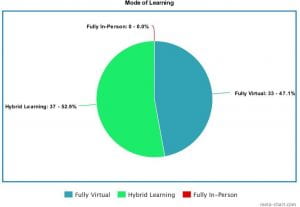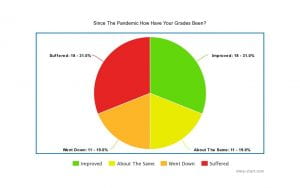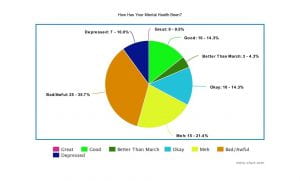by Theodore “Teddy” Lenahan
Since the Ides of March, nearly every American student has been getting an education like history has never seen it. According to Chalkbeat.com, as of October, about 58% of American students were receiving an education completely virtually, while 18% of students have been receiving a mixture of online and in-person instruction, also known as Hybrid Learning. This change in education is something no previous generation has ever faced and the experiences which these students have faced are unparalleled to anything ever seen before.
I virtually interviewed 70 students, ranging from Grade 7 to College Level, across the United States. I asked them all the same questions. “How Did You Handle Going To School In The Pandemic?” “How Have Your Grades Changed Since The Pandemic?” “Has Your School Work Load Changed?” “How Has Your Mental Health Been Throughout Virtual Education?” & “How Is Your Overall Experience With Virtual Education, Do You Like Virtual Learning?” The wide variety of stories and experiences I received from students were astounding!
Of those who were interviewed, 44 of them were women, 23 of them were men, and two of them were non-binary. Something that was noticed was the survey respondents’ mindset, opinions, and answers noticeably changed based on their gender. How each handled and reacted to virtual learning also was very different based on the respondent’s gender. Of everyone who was interviewed, none of them were fully attending school in-person. At 52.9%, the majority of those surveyed had been receiving a Hybrid Education while 47.1% went completely virtual.


“Since The Pandemic & Virtual Learning Started, How Have Your Grades Been?”
The responses were split as follows: 19% said their grades have gone down and 31% said their grades have greatly suffered. It was remarked by students that (as expected) this is partially caused by this new form of learning that has never been executed to this degree. None of the students or educators were ever expecting teaching to be like this. A quick adjustment had to be made by everyone in order to not fall behind in their academics, and not everyone has adjusted to this new form of learning. That goes for both students and faculty. Students have voiced their concerns with their teachers’ execution of online learning– whether it was educators’ lack of understanding with technology or perhaps a slow speed in answering emails. The lack of communication was very challenging and without the convenience of teachers being there in front of students to answer questions many have struggled. Despite this 31% of surveyed students said their grades have improved & 19% have said their grades stayed the same during virtual education. That is the same number as those who have experienced suffering and a decreased grade. For those who experienced an improvement in grades, almost all of those also said it’s not because virtual education is a better teaching method but because it is much easier to get answers to schoolwork– whether from fellow students or from the deep depths of the Internet. Regardless of grades, nearly all surveyed agree that online learning has led to them failing to retain information and this has resulted in students doing work just to get the grade while remembering nothing of what was taught. Something significant to note was the difference between men, women, & non-binary folks and how their grades reflected it. Of the group whose grade improved, the number of women is nearly triple that of men and non-binary respondents. (The math was adjusted due to the increase of female surveyors compared to male and nonbinary counterparts.) Fifteen women and only 3 men had said their grades have improved, while
both nonbinary folks said their grade had suffered.

“Since The Pandemic Began, How Do You Think The Workload Has Changed?”
An overwhelming majority of 78.6% have said their workload has drastically increased since the start of online learning. A countless number of those have said that they believe that their teachers think that students being home gives more time to do work. Some also voiced that a work increase could just be because they just went up a grade level, however, workload seemed to have increased in March as well, previous to a grade level change. 11.4% said that workload stayed the same. These students also said that they see how it may appear that you’re receiving more work, but it might seem as such due to more time in between that class and the next time you see them again. Only 7% have said their workload decreased. One student had said from their point of view they believe that because teachers know with access to getting assignments’ answers easier with the uses of the internet and copying from friends, their teachers had given less work. The separation of each genders’ opinion is even more drastic here. Of all
the people who were surveyed, 87% of men and 100% of nonbinary folks said the workload had drastically increased, compared to 72% of women. Although that’s still a very high percentage, of the 23 men I interviewed 20 of them said their workload had gone up while 32 of the 44 women said it had increased. It was noticed that high school freshmen said their workload stayed the same, more so than any other group.

“How Has Your Mental Health Been?”
Our environment changed so quickly and unbelievably. People went from living their day to day lives to being trapped at home. For some students, school could be the means to escape from that environment even for just a couple of hours, and for some, the opposite. With so much happening in the world so quickly, it was a lot to take in. People’s mindsets changed significantly. Virtual Education was something no student, or teacher for that matter, was ready to jump into headfirst. On the positive side of the spectrum, 14.3% have said they’ve been in a good mental state, and another 14.3% have said they’ve been okay mentally. Of those who said their mental health was good, a fair portion of them also noted that their mental health is “usually in a good place anyway.” However, neither of those groups make the majority. Of all of those who were surveyed, the majority of them said their mental health has been pretty bad or awful at 35.7%, while 21.4% said their mental health “Could Be Better” and 10% of those would be categorized as “Depressed.” Some people have explained how they’ve gotten into ”bad habits” and have done self-harm. This has been extremely tough on all of us, some more than others, but everyone felt some struggle one way or another. At times like these, it’s more important now to check in with one another.

While 4.3% have said that their mental health wasn’t good in March, it is significantly better now. One respondent told me that in March their mental health plummeted to the worst it had ever been. However, since then their mental health improved dramatically. They lost over 32 pounds. They learned how to organize time better while maintaining a healthier lifestyle. During quarantine, everyone had time to themselves– time without their peers’ direct influence. Without surrounding judgment, a lot of people had to think for themselves, which could be terrifying. Peoples’ attitudes changed and peoples’ styles changed; the stigma that existed last year doesn’t exist this year. There was more time for people to reflect inwardly and discover their true selves– time that would’ve never existed without the lockdown. As would be predicted, extroverts had a tougher time adapting to virtual learning.
“Overall Do You Like Virtual Learning?”The vast majority of those said “No.” 54.3% of those surveyed did not like virtual education and another 30% said they “Kinda Didn’t.” This could be predictable, keeping in mind that for half of those who were interviewed grades went down in some way, and even more said their workload increased. Regardless of that, people miss the old “normal” of seeing their friends and making memories in school like they used to– something that was and still is being taken away. Students won’t get this time back. Living with that thought isn’t seen positively by anyone. Some seniors didn’t have a prom or senior trip, and some didn’t even
have a graduation. Some athletes didn’t have sports, some art students didn’t get to perform, and some students didn’t get to see their peers every day. This continues to be a challenge for a lot of people. How the rest of the 2020-21 school year will go is still extremely unpredictable, and that is terrifying. Despite this, 5.7% were “In The Middle”, 4.3% “Kinda Liked It.”, & another 5.7% said they “Liked” virtual education. Some of those who liked it said that although they liked virtual learning, they wouldn’t say they prefer it. Some of those who liked it even said the opposite. One person who was interviewed said that their grades had gotten to an “A” average, compared to having a failing average when they were learning in-person. They’ve also said they prefer being at home to get an education. Half of the others surveyed said the exact opposite.

In Conclusion
What we’re experiencing in these times is something that will live on in the history books. Something different is happening every day and this entire year feels like a fever dream we aren’t waking up from. Things have been excruciatingly hard. In the same year, our nation has experienced a forest fire, a pandemic that reached around the world, national protests in the streets of hundreds of cities, an economic crash worse than the recession, political uproar, a major election, an even bigger forest fire, murder hornets threatening an ecosystem, and the uncertainty of what the coming New Year holds. Virtual education was just a small subtext in the entirety of 2020, yet it’s something that we’ll never forget throughout our lifetime. Although today it’s incredibly inconvenient, the year 2020 will make one hell of a story, and it has a part in what will make us who we are tomorrow. Mask up.
——————————————————————————————————————————
EDITOR’S NOTE: IS YOUR MENTAL HEALTH SUFFERING AS A RESULT OF THE PANDEMIC?
You are not alone! There are many resources available to students. Here are just a few:
Second Floor Teen Helpline
888-222-2228 / https://www.2ndfloor.org
CDC Stress Coping Webpage for Teens & Young Adults
https://www.cdc.gov/coronavirus/2019-ncov/daily-life-coping/stress-coping/young-adults.html
MCVTS Mental Health Resources
https://www.mcvts.net/Page/7575